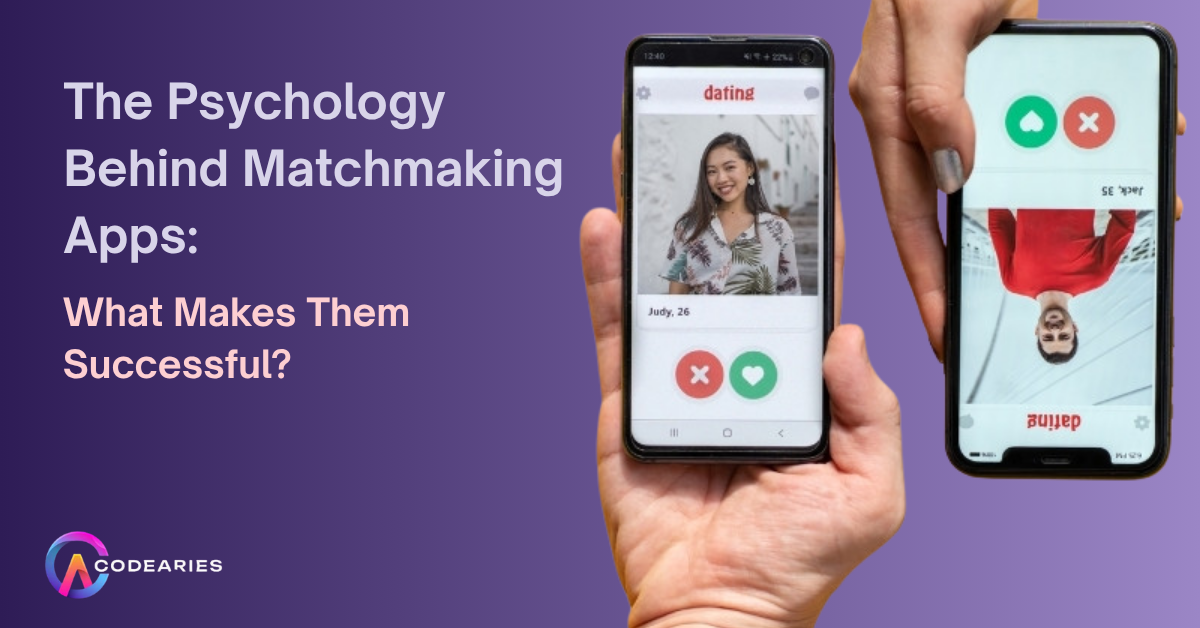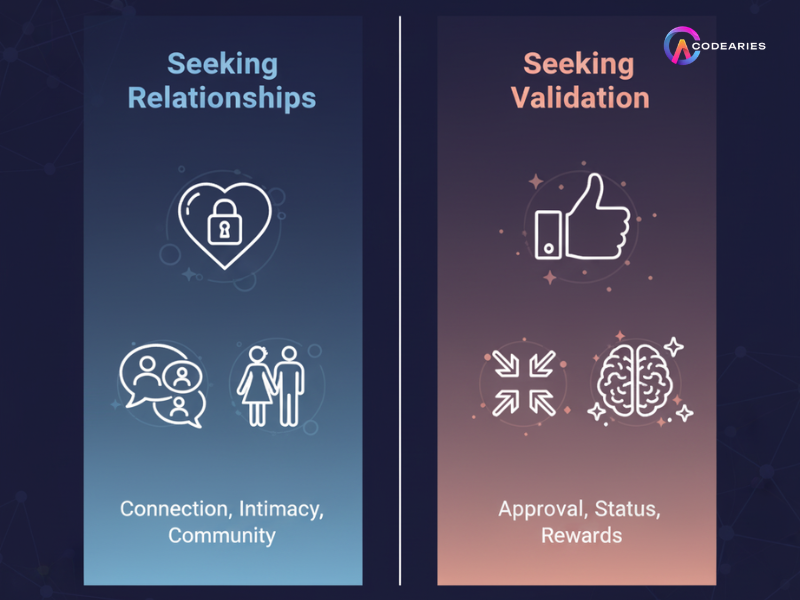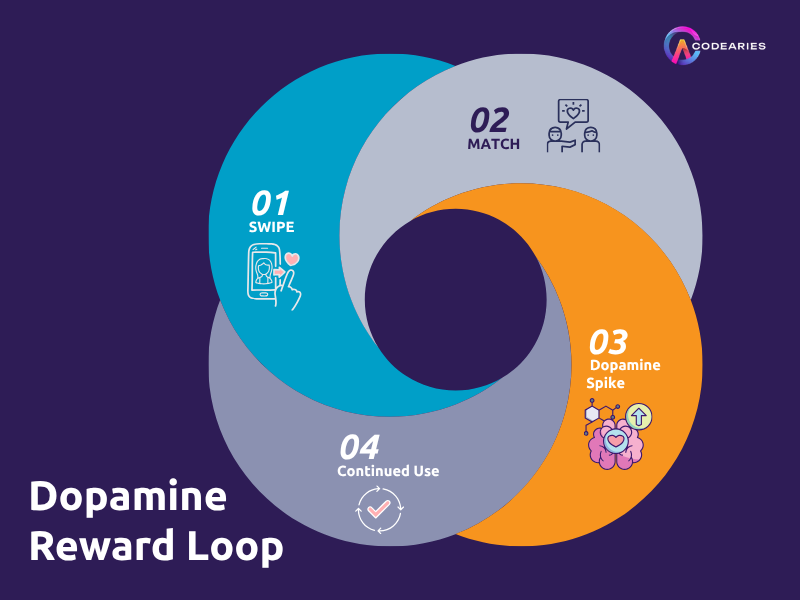
Online matchmaking apps have become a major way for people to connect, date, and build relationships in the digital age. By 2025, millions of users worldwide have turned to these platforms for convenience, choice, and personalized matches. Yet, the true strength of these apps lies in their grasp of human psychology, including the motivations, emotional needs, and social dynamics that drive successful connections.
This blog will delve into the psychological principles that make matchmaking apps work well. It will look at user behavior and preferences and how technology interacts with human nature to boost engagement and satisfaction. Lastly, you will see how Codearies creates matchmaking apps that blend psychological insights with modern technology to achieve meaningful results.
The Psychology of Connection in Digital Matchmaking
The Dual Motivations: Relationships and Validation
Users come to matchmaking apps with various, often complex motives:
- Seeking Romantic Connections: Many users are genuinely looking for long term relationships or meaningful companionship. These relationship driven motives lead to higher engagement and satisfaction when users find successful matches.
- Social Validation and Ego Boosting: Some users are drawn to the instant gratification from receiving likes, matches, or messages, even if they do not want a deep connection. This cycle of social feedback appeals to human needs for approval and belonging, which can lead to addictive or shallow usage patterns.
These differing motivations shape how users interact with apps and what they expect, requiring thoughtful design strategies.

Choice Overload and Cognitive Load
The large number of options on matchmaking apps can sometimes make decision making harder, a situation known as “choice overload.” Faced with hundreds of possible matches, users may feel overwhelmed, leading to decision fatigue, swiping burnout, procrastination, or disengagement.
Effective apps address this by carefully curating possible matches. They reduce cognitive load through personalized recommendations and guided prompts.
Emotional Gratification and Instant Reward
Swiping and matching trigger dopamine responses similar to social applause, providing immediate gratification. Getting a match, message, or like can boost self esteem and bring momentary happiness.
However, this can also create dependency or lead to “gamification” patterns where users focus more on the emotional reward than on finding a partner.
Trust and Authenticity
People want authenticity in profiles and conversations. Trust is crucial for success in online dating. Apps that allow verified identities, promote genuine self presentation, and reduce catfishing or scams tend to keep users and achieve better long term outcomes.
Psychology shows that perceptions of honesty and safety increase the willingness to invest emotionally and in terms of time.
Social Presence and Attachment
Matchmaking apps serve not just as matchmaking engines but as social ecosystems. Features like live chat, voice notes, video calls, and community events enhance social presence and foster attachment, making it easier to shift from online to offline connections.
What Makes Matchmaking Apps Successful?
1. Strong User Intent Alignment
Apps that help users clarify and show their intent, whether casual, serious, for friendship, or networking, create communities with aligned expectations. This alignment leads to more meaningful matches and less frustration.
2. Personalized Algorithms and Behavioral Adaptivity
Successful apps use AI to learn from user actions, feedback, and preferences, continually refining match suggestions. Personalization increases relevance and engagement, making it easier to manage choice overload and enhancing satisfaction.
3. Safe and Respectful Environments
Moderation, reporting tools, and community guidelines promote respectful interactions. Creating a psychologically safe space encourages openness and authentic connections.
4. Balanced Gamification
While gamification can enhance engagement, the best apps balance reward mechanisms with real matching criteria and quality control to ensure users don’t become overly focused on superficial signals
5. Multi Modal Interaction
Offering richer communication methods beyond text increases intimacy and trust. Video profiles, voice messages, live events, and even emerging AR/VR meetups deepen connections.
Psychological Research Insights
- A 2025 study found that users who join with specific relationship goals report greater satisfaction and lower feelings of loneliness compared to those motivated mainly by social validation or entertainment.
- Success is closely linked to perceptions of “attractiveness” and immediate feedback loops, underlining the importance of how profiles are presented and overall app user experience.
- Cultural and demographic factors also shape motives, younger users often balance online and offline experiences, focusing on privacy and control, while older users typically seek convenience and vetting.

How Codearies Helps Build Psychologically Intelligent Matchmaking Apps
At Codearies, we combine behavioral science with AI advancements to create matchmaking solutions that consider human nature and technology.
Our approach includes:
- Psychologically Tuned Algorithms: Custom algorithms tailored to a range of user intents, preferences, and behaviors for more authentic matches.
- User Experience Design: Creating intuitive, user friendly interfaces that reduce decision fatigue and boost trust.
- Multi Channel Interaction: Supporting chat, video, and new XR methods to enrich social connection.
- Safety & Moderation: Utilizing tools to protect users, cut down on harassment, and establish community guidelines.
- AI Powered Content Moderation: Verifying profile authenticity and eliminating false information.
- Data Privacy & Consent: Ensuring compliance with GDPR, DPDP, and other data protections to respect user rights.
- Analytics & Continuous Improvement: Monitoring usage patterns to constantly adapt and personalize experiences.
Partner with Codearies to create matchmaking platforms where psychology and technology come together to build meaningful connections.
Frequently Asked Questions
How does understanding user psychology improve matchmaking outcomes?
By shaping experiences around core motives and emotional needs, apps encourage genuine engagement and long term satisfaction.
What role does AI play in interpreting psychological signals for matchmaking?
AI examines language, behavior, and preferences across touchpoints, allowing for dynamic personalization beyond fixed questionnaires.
How can apps balance engagement features with preventing addictive behaviors?
By designing gamification with clear intent, progressive disclosure, and supporting positive usage habits.
Does Codearies incorporate privacy norms in matchmaking apps?
Yes, we ensure every solution respects user control, transparent data usage, and global legal requirements.
Can you build matchmaking apps for niche communities with unique psychological profiles?
Certainly, We develop custom algorithms and user experiences for various cultural, interest based, and age specific segments to ensure high relevance.
For business inquiries or further information, please contact us at


